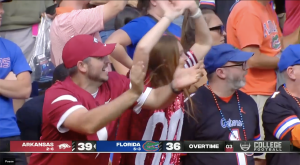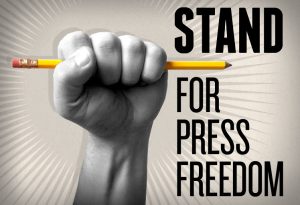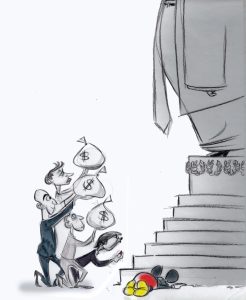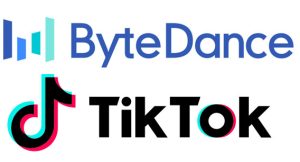4 The Media Business: Conglomerates and Control
By Dave Bostwick
OPENING EXAMPLE – THE BUSINESS OF ESPN
Most U.S. sports fans spend a lot of time watching ESPN. Beyond the on-air broadcasters, commentators, analysts and reporters, many other media workers contribute to what ESPN’s audiences see and hear. Writers, editors and graphic artists prepare special video packages for live games and various other shows, including SportsCenter. Camera operators and producers are crucial contributors, especially for live game coverage.

Walt Disney Company owns ESPN, and executives from Disney and ESPN have made strategic decisions about when to air certain games on which outlets, such as ESPN, ESPN2, ESPNU, ESPN+ and the SEC Network. Disney also owns ABC, so occasionally audiences can choose between competing broadcasts of the same big-time game offered live on ESPN and ABC, with different commentary and analysis on each network.
Furthering its dominance in sports broadcasting, ESPN acquired the NFL Network in 2025 to form a strategic partnership between the NFL and ESPN.
At some point during ESPN game broadcasts, a promotional item may suggest that viewers seek more live game info from the ESPN website or through a social media platform. And one research study showed that sports fans spend up to 20% of every game watching various gambling advertisements.
For the most part, companies and their employees, not the U.S. government, make business decisions about the media content we consume. These decisions are often tied to revenue. No governmental officials have told ESPN executives that they have to air certain games at certain times or promote specific items or actions while broadcasting a game.
YOUR MEDIA LANDSCAPE
If you are planning a media-related career, how do you envision money will be generated to pay your salary?
If you are NOT planning a media-related career, in what ways will mass media content and technologies still impact your employer’s business model?
MEDIA CONTROL
Let’s shift from ESPN to the broader landscape of U.S. media as a whole.
In the United States, direct governmental media control is limited compared to most other countries. A 2024 survey of internet censorship showed the United States as one of the less-censored countries in the world, but still ranked behind Canada, Australia and several European and South American countries.
Since Donald Trump was elected U.S. president in 2024, however, Americans’ opinions about free press have increasingly depended on political affiliation. A Pew survey showed that among Republicans, the share who described the press as “completely free” increased from 29% to 42% between April 2024 and March 2025. Among Democrats, the number decreased from 38% to 25%.
The following presentation explains some governmental influences on American media content.
Study the presentation slides by using the forward button or clicking on sections of the control bar. To enlarge any interactive presentation in this book, click on the lower-right full-screen option (arrows).
From a global perspective, the most restrictive countries include North Korea, China, Iran, Iraq, Russia and Saudi Arabia, where content may be subject to government approval or created entirely by the governments themselves. This typically is not the case in the United States.
For example, Russian law prohibits the use of “war” or “invasion” in coverage of Russia’s military conflict with Ukraine. The government-approved term is “special military operation.”

Many governments with internet infrastructure suppress criticism and protect power by banning foreign websites and platforms. For example, the government in India forced social networks to limit content that was critical of Prime Minister Narendra Modi. And in 2024, Brazilian authorities banned X (formerly Twitter) and ordered Apple and Google to remove the X app from iOS and Android devices in Brazil, although the ban was later lifted.
In 2024, the organization Reporters Without Borders observed the concerning trend that “press freedom around the world is being threatened by the very people who should be its guarantors – political authorities.”
Here’s a flip-card question to emphasize a key distinction.
That’s not to say that governmental entities never intervene in media matters, as you saw in the in the presentation above and you’ll read later in this chapter’s section about TikTok. Generally speaking, though, business owners have more control over media content than the U.S. government.
FREEDOM OF SPEECH IS GUARANTEED TO WHOM?
In the heyday of U.S. print newspapers and the printing press, a popular expression said that freedom of the press is guaranteed only to those who own one. That concept from U.S. media history repeated itself in 2013 when Amazon founder Jeff Bezos purchased The Washington Post and in 2022 when Tesla co-founder Elon Musk acquired Twitter (which was soon rebranded as X).
Today, one could update the expression to say that freedom of speech is guaranteed to those who own communications satellites. The New York Times’ Adam Satariano reported that Musk “is controlling this new, incredibly important area of communication in satellite internet” through his Starlink company. According to Satariano’s podcast, in 2024 Musk and Starlink owned more than half of the 8,000 active satellites circling Earth.

It can be difficult to judge the extent to which powerful media figures and businesses directly control what we see and read. For example, in early 2025, editors of The Washington Post rejected a cartoon (shown above) that depicted Bezos, Musk and other media figures (including Mickey Mouse) offering money and/or loyalty to a statue of Donald Trump. The Pulitzer Prize-winning cartoonist, Ann Telnaes, immediately resigned and wrote a column on Substack titled “Why I’m Quitting the Washington Post.”
A Post editor said he disagreed with Telnaes’ interpretation of the events that led to the cartoon being rejected. Telnaes, however, said the decision to kill her cartoon was “dangerous for a free press.”
One month later, the newspaper’s opinions editor resigned in protest after Bezos sent an office memo to the the staff. Bezos memo told the opinions staff that “we are going to be writing every day in support and defense of two pillars: personal liberties and free markets.”
MEDIA CONGLOMERATES
Some companies are so gargantuan that they own lots of other large companies. The chapter introduction mentioned that the Disney conglomerate owns ESPN and ABC, for example. Please spend some time exploring the labeled web links in the following presentation slides, paying attention to the companies and assets owned by each media conglomerate.
Study the presentation slides by using the forward button or clicking on sections of the control bar. To enlarge any interactive presentation in this book, click on the lower-right full-screen option (arrows).
Conglomerates occasionally grow so large that the federal government intervenes. In 2024, for example, a judge ruled that Google had become a monopoly that prevented fair competition. One concern involved Google making deals with Apple for Google to be the default search engine for the Safari web browser on iPhones, iPads and Mac computers, thus limiting consumers’ choices for online search tools and dissuading other companies from developing new search products.
Another case brought by the Justice Department questioned Google’s monopoly in online advertising markets.
ABOUT BYTEDANCE
One additional media conglomerate we should discuss is ByteDance, which is based in China.
A New York Times article said that “many U.S. lawmakers and regulators in the United States argue that TikTok can share sensitive data about the location, personal habits and interests of Americans with the Chinese government, and that the app can be used to spread propaganda.”

The NY Times article also noted that “TikTok itself is not available in China — users there must access a different ByteDance app, which follows Chinese government directives on censorship and propaganda.”
In 2023, the chair of the Senate Intelligence Committee said on Face the Nation that the Chinese equivalent of TikTok gives Chinese youth far more STEM-related content to shape their interests toward those careers. Conversely, in the United States, popular social media platforms such as Facebook, Instagram, X and Snapchat are not required to shape their content to push younger users toward educational goals, such as promoting STEM careers.
Subsequently, in 2024, members of the U.S. Congress passed legislation, signed into law by President Joe Biden, to ban TikTok nationwide or force ByteDance to sell TikTok. This decision relates to the earlier chapter section titled “Media Control,” as the Chinese government can require Chinese companies (such as ByteDance) to share user data and run businesses in a manner that benefits the Chinese government. This is typically not the case for U.S. media companies.
In January 2024, TikTok CEO Shou Zi Chew testified during a U.S. Senate inquiry about Online Child Safety , which led to this confrontation between Missouri Republican Sen. Josh Hawley and Chew.
Hawley’s style at times is confrontational, but this is not just a Republican vs. Democrat debate. In a separate Congressional proceeding, U.S. Rep. Marc Veasey, a Democrat from Texas, also expressed concerns to Chew about TikTok’s data sharing with the Chinese government.
At one point in the interaction with Senator Hawley, the TikTok CEO said, “Senator, as we know, the media doesn’t always get it right.” Given TikTok’s prominence and impact in the U.S. media landscape, this can seem ironic. Chew’s comment suggests “the media” is a singular entity that does not include TikTok.
As of July 2025, TikTok’s future in the United States remained uncertain. President Donald Trump delayed enforcement of a TikTok ban or forced sale. With reduced publicity, TikTok remained available in the Google and Apple app stores
NET NEUTRALITY
Now we’ll look at an evolving debate related to internet control and access in the United States.
Differing views about net neutrality have raged for more than two decades. Here’s a fun (but maybe opinionated) 2018 video from Burger King that tried to explain net neutrality via the Whopper.
The video is humorous and provides an interesting case study in corporate advertising for public relations advocacy. The video isn’t directly trying to sell Whoppers; instead, it tries to make viewers feel as if Burger King is on their side about the need for net neutrality.
For our purpose in this chapter, though, the video effectively frames one part of the net neutrality debate: Should media companies be allowed to control tiers of internet access and content?
As a simple example, if Media Business A pays an internet service company to prioritize speedy online connections for consumers to access streaming content from Media Business A, does this put the much smaller Media Business B at an unfair disadvantage? Media Business B may be new and unable to pay an internet service company so that consumers enjoy speedier connections.
(Or put another way, would it be OK for Netflix to pay internet service companies more money to ensure the Netflix subscribers have a faster, more reliable connection, even if that puts some of Netflix’s smaller competitors at a disadvantage?)
Let’s consider a few policy questions in the following presentation.
Study the presentation slides by using the forward button or clicking on sections of the control bar. To enlarge any interactive presentation in this book, click on the lower-right full-screen option (arrows).
One net neutrality group, the Electronic Frontier Foundation, provides this definition: “Network neutrality is the idea that internet service providers (ISPs) should treat all data that travels over their networks fairly, without discrimination in favor of particular apps, sites or services.”
The evolving debate has already taken several twists and turns. Federal net neutrality laws were repealed in 2018. However, in 2024 the Federal Communications Commission (FCC) reclassified broadband as a public utility, much like water and electricity, which would have strengthened the government’s ability to monitor and enforce net neutrality regulations.
In early 2025, though, a federal appeals court struck down the FCC regulations, ending governmental attempts to regulate broadband internet providers as utilities. This ended net neutrality on the federal level, at least for now, but the debate may continue at the state level and as a matter of philosophical fairness.
A key question is whether internet access should be considered a right or a privilege.
DATA COLLECTION AND PROTECTION
We’ve briefly discussed who controls what we see, watch, read, and hear in U.S. media. Due to widespread adoption of the internet, we could add one more question. Who controls and safeguards the data that is collected as we consume and interact with mass media platforms?
Through IP addresses and other personal identifiers, it’s easy for media conglomerates to collect data for future research or sales. With artificial intelligence, some of these processes become more automated.
A programmer for Research Company A can collect data and include a privacy statement about data usage for research only. That may not prevent Data Company B from purchasing Research Company A’s data and then selling it to advertisers (now twice removed from the source) or Advertising Company C.
For example, an investigative article in Vice described how the U.S. military bought location data from ordinary apps. It featured this subheadline:
A Muslim prayer app with over 98 million downloads is one of the apps connected to a wide-ranging supply chain that sends ordinary people’s personal data to brokers, contractors, and the military.
The article noted that several app developers “did not know their users’ location data was being sent to defense contractors.”
More recently, a New York Times report chronicled how the Pentagon tried to hide that it bought Americans’ data without a warrant. The article detailed the workaround for law enforcement officials to purchase broad swaths of data rather than target individual users’ phone records.
Obtaining location data from U.S. phones normally requires a warrant, but police and intelligence agencies routinely pay companies instead for the data, effectively circumventing the courts.
CLOSING THOUGHT
You’ve read about large global media conglomerates that seek to profit from worldwide consumers. You’ve also read about some countries’ attempts to limit or control citizens’ access to outside information. Note the competing interests in the previous two sentences.
You may occasionally hear the term “walled gardens” referring to each country having its own rules for governmental control of media. In the future, large media companies may be forced to alter products, entertainment and information based on the conflicting rules in hundreds of worldwide walled gardens.
FILL IN THE BLANKS
MEDIA CONGLOMERATES
Pick two of the major conglomerates included in this chapter’s presentation about media conglomerates. As a reminder, here are your choices.
- Warner Bros. Discovery
(Separating into WBD Global Networks and WBD Streaming & Studio) - Paramount
(Merging with Skydance to form Paramount Skydance Corporation) - Google
(Subsidiary of Alphabet / Products listed at bottom of web page) - NBCUniversal
(Part of newly created conglomerate Versant) - Disney
(Focus on media-related companies) - Gannett
(Both national and local brands) - Meta
The links above and in the chapter presentation about media conglomerates will be good starting points, but you can search for additional information outside the chapter content if needed. Be sure to explore each conglomerate thoroughly. Don’t just rely on copying or rephrasing website promotional text in your responses.
TASK A – List five prominent media outlets, companies or products that each one of your two selected conglomerates owns. Write a one-sentence description for each of the 10 media properties that you list for your two conglomerates. Pick examples with which you are familiar or want to learn more about; don’t automatically list the first five you see on each conglomerate website.
(You will list 5 properties for each conglomerate for a total of 10 properties, with a one-sentence description for each of your 10 properties.)
TASK B – Write at least two separate paragraphs (at least one paragraph for each conglomerate) detailing what surprised you most in your research about the two conglomerates you studied, especially related to your personal media usage. Avoid repeating PR content from the conglomerate websites if that content is used to promote how a conglomerate contributes to the health and well-being of society. Follow journalistic style with no more than three sentences per paragraph.

